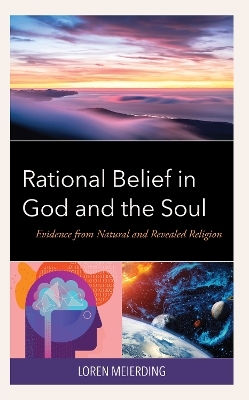
Rational Belief in God and the Soul
Hamilton Books (Verlag)
978-0-7618-7440-9 (ISBN)
After investigating the relevant evidence, what should a rational person believe about the existence of God and his nature? The first task is to examine evidence from natural religion, that is, from science and human observation. The inductive evidence indicates overwhelming probability intelligent beings caused the Universe and life to exist. Rational beings should hold the Principle of Sufficient Reason, and if they do, traditional deductive arguments for God’s existence seem compelling. There is a possibility given the evil in the world that the intelligent causes are benevolently disposed to human beings. There is definitive evidence human souls can separate from their bodies while perceiving and understanding surrounding events. Also the consensus gentium evidence provides some confirmation for theism. So the evidence from natural theology shows a rational person should believe the first causes are intelligent, powerful, and perhaps benevolent, but tell us little more.
Rational persons seeking any further knowledge of God must seek communications from God himself through revealed religion. Miracles can provide key evidence for communications coming from God. An argument for the occurrence of miracles is offered with some insightful examples. The Bible makes important predictions or prophecies that came true. Such events are only explained by intervention of a powerful, intelligent being acting with a purpose. Evidence about historical events from the Second Millennium onward show the reliability of the Bible. Thus there are good grounds for concluding the Bible offers us communications from God. It shows actions by him and provides information about his nature and purposes. So given that the Old and New Testaments provide evidence about God, we can draw conclusions about his nature and purposes and how human beings should live in response. A number of Biblical passages emphasizing Jesus’ parables are cited. They give readers an opportunity to decide for themselves.
Loren Meierding worked as a systems engineer in aerospace and has published twelve books on religious and economic topics including: God, relationships, and evil, the fourteen Christian virtues, and the truth about inequality.
Part 1:Natural Religion
Chapter 1: A Framework for Justified Belief and Knowledge
Chapter 2: Possible Limitations on Knowledge and Truth
Chapter 3: The Mind, Soul, and Materialism
Chapter 4: The Relation between the Physical Constants
Chapter 5: The First Cell
Chapter 6: Evolution Examined
Chapter 7: Traditional Arguments for God
Chapter 8: A Benevolent Creator Being?
Chapter 9: Evidence from Human Opinion
Chapter 10: Moral and Societal Norms
Part 2: Revealed Religion
Chapter 11: Would Creator Beings Communicate?
Chapter 12: Evidence for Miracles
Chapter 13:Creation and Prophecies of Christ
Chapter 14: More Fulfilled Prophecies
Chapter 15: Reliability of the Bible I
Chapter 16: Reliability of the Bible II
Chapter 17: God in the Old Testament
Chapter 18: God in the New Testament
Chapter 19: Two Destinies
Chapter 20: Principles for Living
Bibliography
Index
About the Author
| Erscheinungsdatum | 13.04.2024 |
|---|---|
| Verlagsort | Lanham, MD |
| Sprache | englisch |
| Maße | 159 x 236 mm |
| Gewicht | 549 g |
| Themenwelt | Geisteswissenschaften ► Philosophie ► Erkenntnistheorie / Wissenschaftstheorie |
| Geisteswissenschaften ► Religion / Theologie | |
| ISBN-10 | 0-7618-7440-2 / 0761874402 |
| ISBN-13 | 978-0-7618-7440-9 / 9780761874409 |
| Zustand | Neuware |
| Informationen gemäß Produktsicherheitsverordnung (GPSR) | |
| Haben Sie eine Frage zum Produkt? |
aus dem Bereich

![Was heißt Denken?. Vorlesung Wintersemester 1951/52. [Was bedeutet das alles?] - Martin Heidegger](/media/113619842)
